"Black Panther: Wakanda Forever" Deals With Shared Grief In The Most Unique Way Of Any Film I've Ever Seen
- Oops!Something went wrong.Please try again later.
- Oops!Something went wrong.Please try again later.
- Oops!Something went wrong.Please try again later.
🚨Warning: This article includes major spoilers for Black Panther: Wakanda Forever.🚨
@Twitter / Via media.giphy.com
Black Panther: Wakanda Forever is not your typical Marvel film. In fact, it's unlike any superhero film ever made. Sure, there are the CGI battle scenes, universe-building cameos, and the very distinct MCU humor beats. But it deals with a real-life tragedy within the film, which gives the movie a meta feeling that borders on fourth-wall breaking.
Here is my in-depth review of Black Panther: Wakanda Forever!
The passing of Chadwick Boseman is a shared grief that the audience, the actors, and the MCU characters themselves mourn together. I don't think I've ever experienced a superhero film where actors, audiences, and characters were all interconnected through the shared grief of loss in this way.
Marvel / Disney / Via media.giphy.com
In fact, I'm not entirely sure I've watched any movie with this unique approach. Think about it. While you're mourning Chadwick, you're also mourning T'Challa. The same can be said for Letitia Wright: She's mourning Chadwick, and her character Shuri is mourning T'Challa. The audience, the actor, and the character are all sharing the same feelings of pain and sorrow together, interconnected in such a complex yet simple way that it really affected my whole viewing of the movie deeply.
Ryan Coogler was very aware of this. And although there were cries and petitions to recast T'Challa, the world needed this. We all needed an opportunity to grieve and celebrate both Boseman and T'Challa. Coogler provided this unique experience, and the stellar cast drives it home.
Side note: Can we get Angela Bassett that damn Oscar already? Ya'll tripping. This whole intro was low-key my elevator pitch for her Oscar award. Moving the hell on...
Letitia Wright puts the weight of this grief on her shoulders and delivers in a way I wasn't expecting. It was beautiful to see her character, Shuri, go through a similar arc of grief that T'Challa went through in Captain America: Civil War.
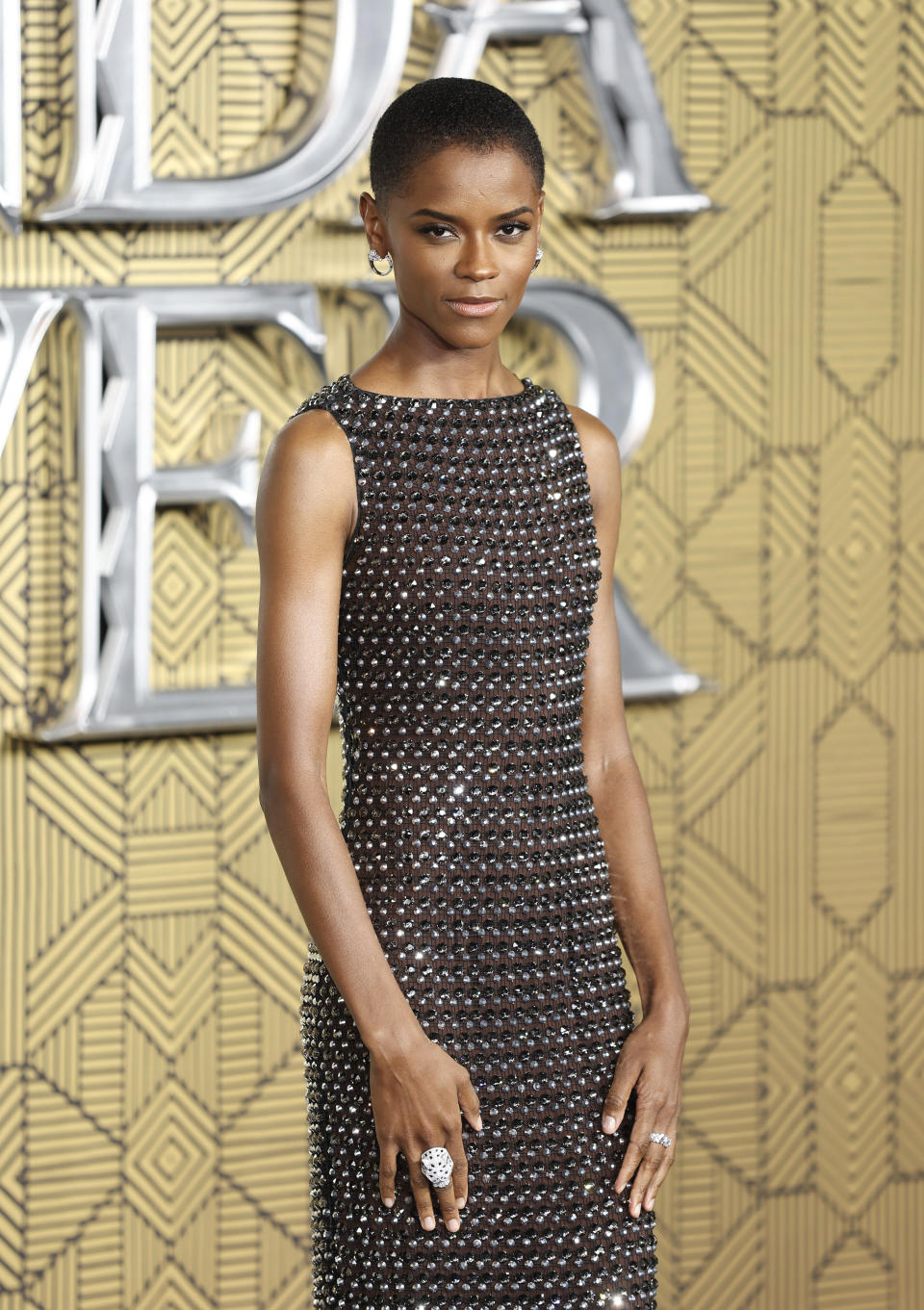
In the opening scene, where T'Challa dies from an unknown illness, I didn't feel the true weight of his death. It occurs so fast and without explanation that I didn't connect to it as much as I would have liked. However, Shuri's fervor to save her brother is something that shined through in those opening moments. The desperate need to succeed when you consider yourself the only person who can do it really stuck with me.
Can we all just marvel at the all-white funeral? I don't think anyone in the theater moved an inch during those scenes.
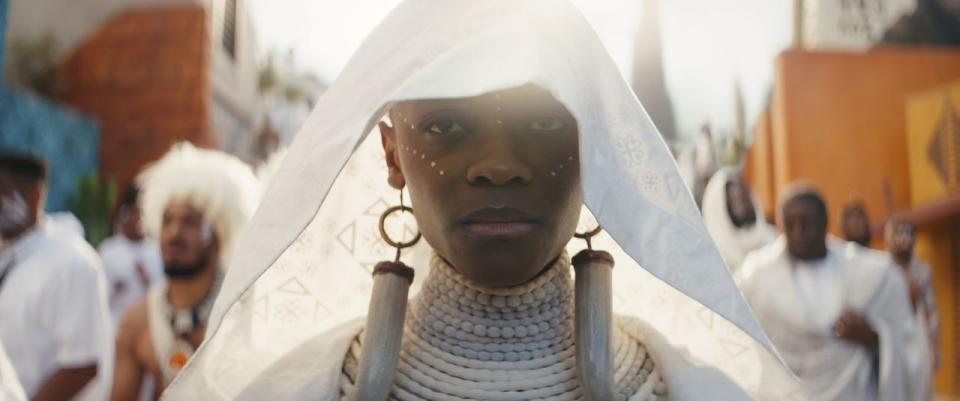
Black women take the center stage in this film, another perfect example of Coogler using real life to reflect his art. Too often, it is Black women who are left to pick up the pieces when our sons, brothers, and fathers die. Rebuilding what was broken on more than just a physical level, but a spiritual and mental level, is left in the hands of Queen Ramonda.
Marvel / Disney / Via @leroypatterson
But grief isn't solely owned by Wakanda. In the depths of the ocean, we meet the Talokan people and their leader, Kukulkan, aka Namor.
Marvel / Disney / Via media.giphy.com
Coogler decided to transform Namor into an ancient Mayan mutant, a sharp twist from the comics, where his lore is based in Atlantis. The idea works to brilliant effect, giving the villainous mutant a rich cultural lore and a motive that reflects that of Wakanda.
Namor and his people were forced underwater during the Spanish Inquisition, which ravaged and enslaved entire civilizations. Much like Wakanda, the Talokan people have found a reliance on Vibranium. In fact, by ingesting their own version of the heart-shaped herb, the Talokan people developed their ability to breathe underwater.
I'm not entirely sure how I felt about this twist.
Marvel / Disney / Via @leroypatterson
I'm OK with the difference from the comics, which still places Namor as one of the earlier mutants in existence. Spreading the heart-shaped herb and Vibranium around to other nations did take away from Wakanda's magic and power for me though. However, setting up a nation that could equal or surpass Wakanda's power paid off by the film's end, and I can see how Kevin Feige and Coogler would want this for the long run.
Namor's grief stems from his mother's dream of returning to her homeland. After the mighty mutant discovers slavers in the land his mother called home, he and the Talokan people murder them. His grief for his motherland then turns into vengeance for the surface world.
Namor's overall arc has Killmonger vibes, which I'm not mad it. It's a conversation that needs to be continued and elaborated on.
Now here's a change from the comics I really loved!
Marvel / Disney
One of the slavers calls Namor (who he perceives to be a demon child) "El niño sin amor," which translates to "the boy with no love." It is in this way Namor comes up with his name, taking the "n" from "sin" and placing it with "amor." Namor himself states he has no love for the surface world, which ties everything together perfectly. In the comics, Namor is simply Roman spelled backward, so Coogler adding a Mesoamerican background to the origin helps build out the lore and the MCU as a whole.
Also, tell me that first scene when you see the Talokan using some type of singing-hypnosis to make people drown themselves wasn't one of the most badass things in an MCU film!
As the film progresses, we are introduced to RiRi Williams. In the comics, Williams is one of the smartest people on the planet. We're talking Tony Stark, Reed Richards smart.
Marvel / Disney
Dominque Thorne brings a lightheartedness to the role and is a bright spot in the film. While almost everyone around her is dealing with grief, RiRi is not. Although she uses her father's memory to power her dreams, she is not stuck in a place of mourning as almost everyone else in this film is. She has essentially come to terms with her grief and finds a productive way to channel it. It really helps to give some levity to the overall tone.
RiRi is a scientist who develops a machine that can locate Vibranium, which leads some greedy colonizers to Talokan, a city made from the rare metal. And herein lies the main conflict of the film. Namor seeks to kill RiRi, as she's the only person who has been able to create this device. Wakanda steps in to save her, and now we have two nations at battle.
This battle between Wakanda and Talokan is fought over resources, yet another instance of Coogler using real life to influence his direction. While the colonizers want Vibranuim for themselves, both Wakanda and Talokan seek to stop the exploitation of their resources.
Marvel / Disney
This is all set in motion by T'Challa's choice to open Wakanda to the world in the first film. After being a secret and secluded country for all of its existence, Wakanda was exposed after T'Challa made the choice to reveal the truth about the nation. Now the world is very interested in Wakandan (and by extension Talokan) resources.
It's wrapped around this battle for resources where Coogler and Feige give us our MCU universe-building. Julia Louis-Dreyfus's Allegra de Fontaine serves as our big connection, and we finally have her motive.
Marvel / Disney / Via media.giphy.com
Allegra de Fontaine, who we learn is the ex-wife of Martin Freeman's Everett Ross, seeks to destabilize Wakanda and gain as much Vibranium as she can. This sets up the plot for Thunderbolts pretty well. It appears she is getting a team together to potentially infiltrate Wakanda and rob the nation of its resources so she can build weapons for the government. By the end of Wakanda Forever, it seems as if Fontaine and her team are heading for direct conflict with the advanced African nation. I imagine the Thunderbolts film will bring back Black Panther and Namor, or at least their respective tribes.
Speaking of bringing back Black Panther... I'm happy the film stuck to the comic roots and made Shuri Wakanda's new protector.
Marvel / Disney / Via media.giphy.com
There was a lot of debate about who was in the suit, or who would take the Black Panther mantle. But who else would it be? Shuri's journey to don the suit is an origin story of its own, giving this sequel a low-key "first entry" vibe.
Shuri's grief at first turns into depression. We see her dealing with her brother's death by digging into her work and avoiding people. It's Okoye who suggests that Shuri should be exposed to the world in her time of grief, which leads to the princess being taken by Namor to his underwater kingdom. Okoye was right — Shuri definitely needed to step out into the world. However, she loses her position as Dora Milaje for losing Shuri. This scene had me shook ya'll!
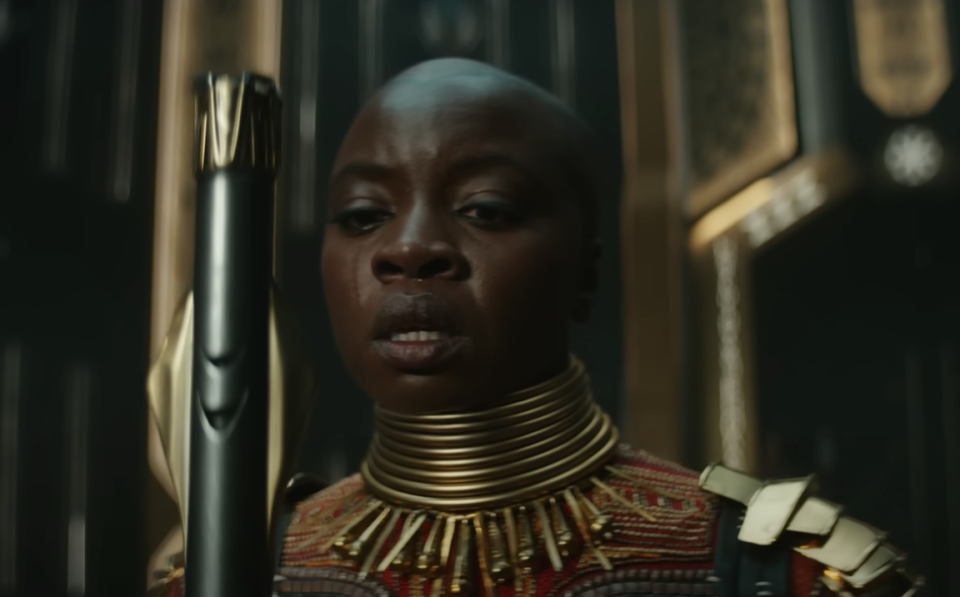
When Shuri is introduced to the nation of Talokan, we can feel the admiration through the screen. It's the first glimpse of happiness we really see from her. The underwater city is gorgeous, and the Vibranium "sun" feels to me like a tool or McGuffin we'll see utilized later in the MCU.
Shuri is rescued by Nakia, in a plot thread that felt more like a spy film. I loved the Winter Solider vibes Nakia's storyline gave me here, as she is tasked with infiltrating an underwater community and saving Shuri.
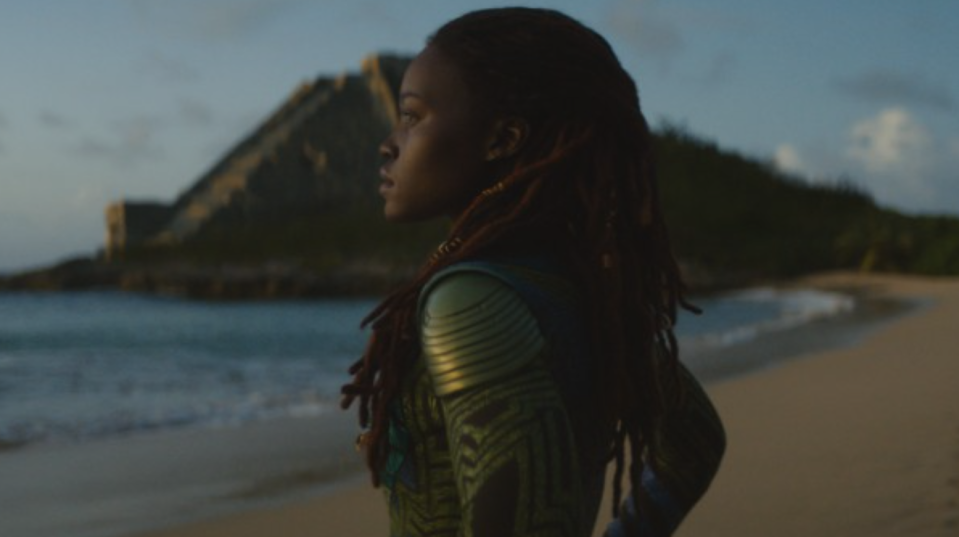
It takes a while for Nakia's involvement to come, but the pieces make sense. Nakia didn't really "feel" like a spy in the first film, but I get those full vibes here. One of the Talokan people is killed while Shuri makes her escape with Nakia, causing Namor to seek vengeance against the powerful African nation.
Once again, grief becomes vengeance. Namor attacks Wakanda, and in the ensuing flood, Queen Ramonda is killed. I was NOT expecting Coogler to kill off the Queen. How much can one family go through?!
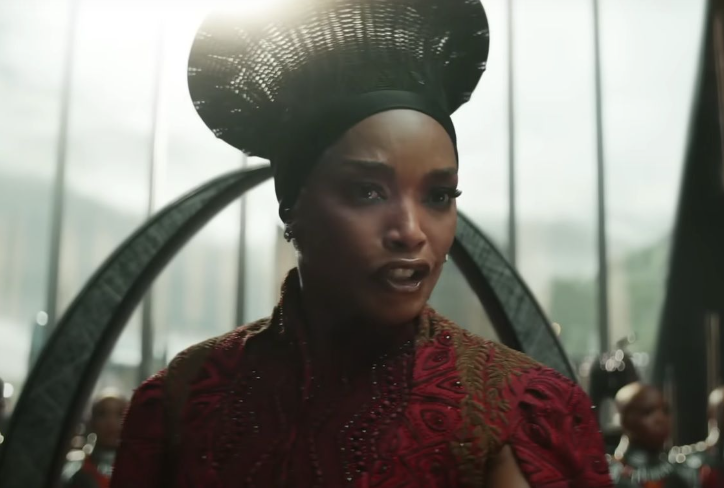
This one really hurt. While already sifting through your emotions about T'Challa, the film slaps you with more death. You feel angry for the family. Your anger bubbles, and you want revenge. So does Shuri. She is able to create a synthetic heart-shaped herb and becomes the new Black Panther.
Cue the Killmonger cameo. Instead of seeing her mother or her brother, Shuri sees Killmonger when she visits the land of her ancestors during her vision. Shuri's grief is now rage, and her spirit is on fire. Killmonger explains that it was Shuri's rage and quest for power that brought his spirit to her.
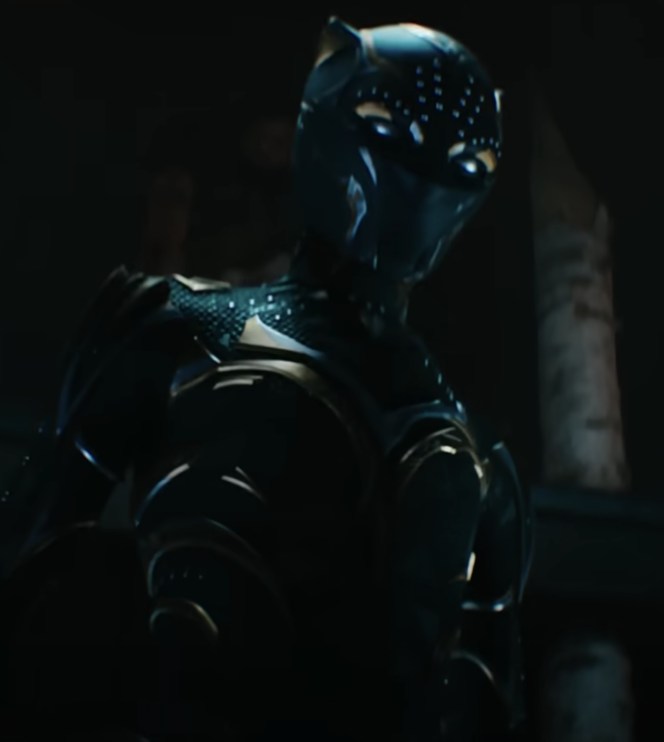
I loved this scene because it shows how we can internalize grief. Sometimes, we try to lie and argue with ourselves before giving into our darker emotions. Shuri claims she's nothing like Killmonger, but he proves her wrong. She only wants power so she can exact vengeance based on her grief. He says she's more like Killmonger than T'Challa. But T'Challa had to overcome his own lust for vengeance in Civil War. Now Shuri's journey takes her down a similar path.
This is such a big metaphor for the Black and Brown communities. How do you process your grief? Do we continue a cycle of vengeance? Do we become beings of rage? It feels like Coogler took inspiration from films like Menace II Society and Boyz n the Hood here.
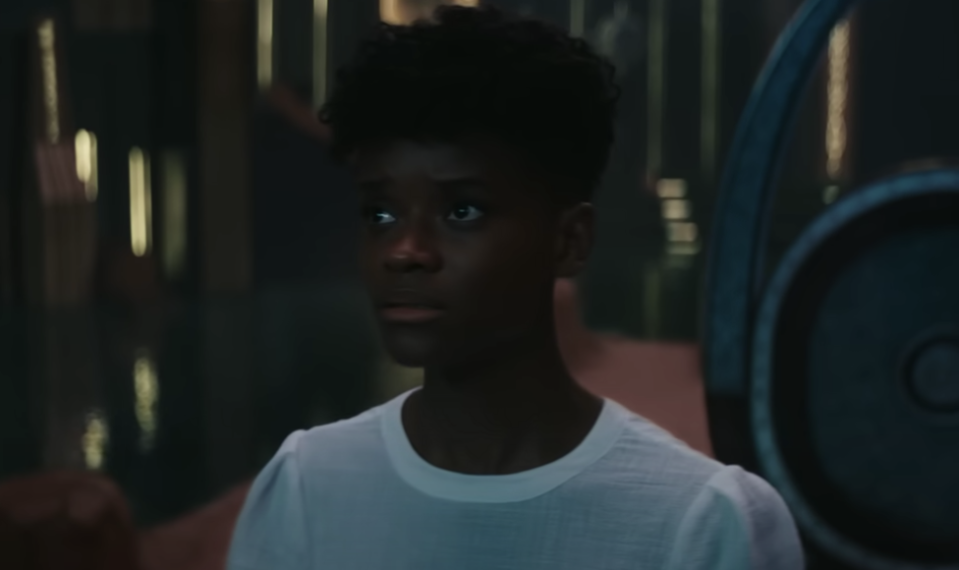
M'Baku and Shuri share a scene where he warns her of the dangers of her rage, and how her mother would not approve. But Shuri's response was that of someone in pain. She is in so much agony she refuses to live for the memory and dreams of her brother and mother. Instead, she needs to ease that pain by causing more of it. Hurt people hurt people.
By the time we get to the film's climactic finale, which is fun to behold, Shuri overcomes her rage. She allows Namor to live and offers him a truce. It's an end to the cycle of killing. And let me tell you, I WANTED her to kill him. Although I know how important Namor is to Marvel lore, I was just mad. How can you let the man who killed Angela Bassett — I mean, Queen Ramonda — live?
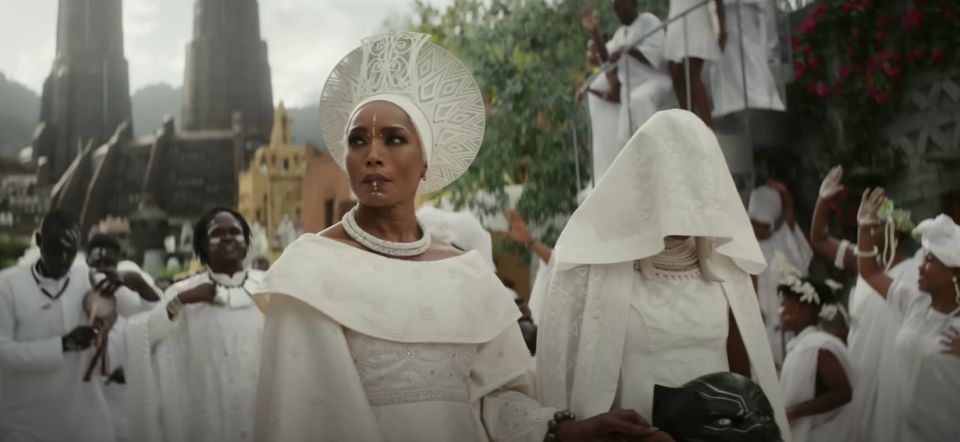
And of course, Feige wasn't going to let Coogler just kill Namor. But I felt satisfied with it as well, because it completed the arc of grief. Do we continue to kill and harm each other, even if the other person deserves it? Shuri was able to conquer her feelings of rage for a man that killed what she believed to be her last remaining relative. There is no need for Wakanda and Talokan to be positioned against each other, when there is a bigger threat pushing them toward their own destruction. The two nations were made enemies over a resource, but they are more alike than different. The reflection of life in this film ranks miles ahead of anything the MCU has done (besides the first Black Panther, of course).
I want to touch on the final battle between Shuri and Namor as well. I've seen some chatter about Shuri not having the training nor the battle experience to stand against Namor, but the film takes care of that perfectly. It's very obvious Shuri is outmatched throughout their entire fight. She gets her ass kicked for most of it (and nearly dies). She's able to use her agile movements and the Black Panther suit's kinetic release to hold her ground. Of course, having super strength also helps. However, in the end, it's her intelligence that wins the day. Discovering Namor's weakness is what saves her. He is the better warrior, but Shuri is the smarter fighter.
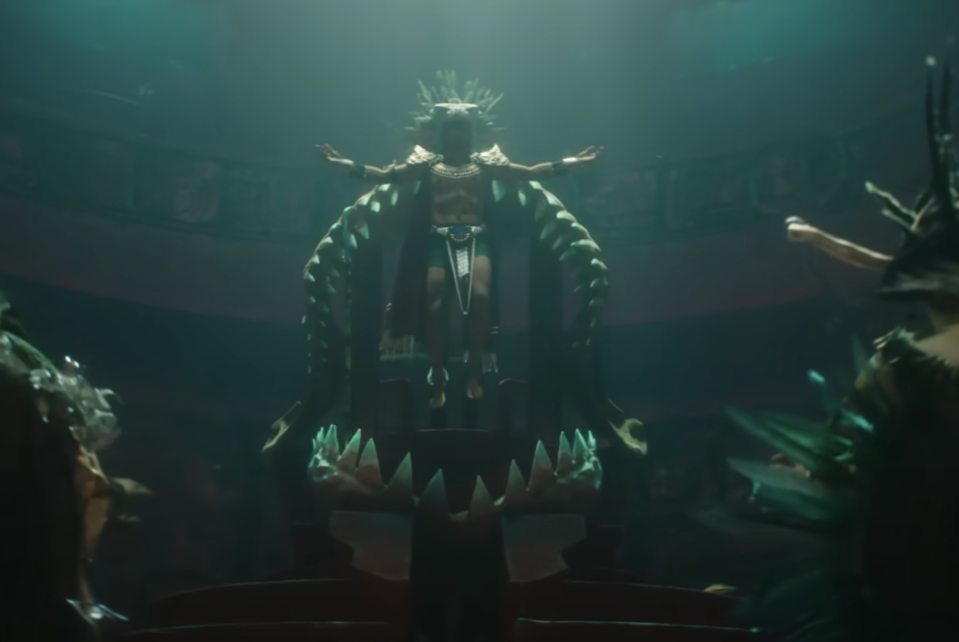
Namor returns to the sea, still with nefarious plans on his mind. Much like his comic book counterpart, the sea-loving mutant is hell-bent on punishing the surface world. His grief has stagnated and hardened at the "rage" stage and never progressed. It is who Namor is, with even his name stemming from "no love" in the MCU lore. He is the perfect anti-hero/villain for the MCU, a character who is quick to kill and who works with both heroes and villains as long as his nation comes first. When the colonizers come for Wakanda in Thunderbolts, as I'm sure they will, Namor and his people may be Shuri's backup plan. So he still has an opportunity to wage his war on the surface world.
And let's not forget about that mid-credit scene! The "recast T'Challa" people can shut up now...thankfully. Coogler has brought us T'Challa II, which I think was a brilliant way of honoring Chadwick and T'Challa at the same time.
Marvel / Disney
Nakia has a son, by T'Challa, who she names after his father. In the comics, Marvel often ages characters by sending them into the future and having them return to the present. Cable and Hope Summers are two prime examples of this. The MCU can take this approach, especially with time being the center of this Multiverse Saga. Our new young T'Challa II can go forward in time, train and age for years and years, and then return to the present as our newly recast Black Panther. Or we can just get introduced to a future version of him in another film.
For me, Wakanda Forever is just as good as the first Black Panther. Mainly because of the meta approach to dealing with the death of both T'Challa and Chadwick. Each character gets a moment to reflect on his passing in the film, and it feels like the real-life actors are just having a conversation with us. When Nakia breaks down about why she didn't go to the funeral and how the loss was so final, I started weeping in the theater. The entire cast really brought such passion and strength to their performances.
Marvel / Disney
Never have I seen a film tackle real-life loss by intertwining it with the fictional characters and giving the audience and the cast a shared experience of mourning. It was brilliant, cathartic, and unique. Plus, the introduction of Namor and the nation of Talokan really builds out the MCU. I'm excited to see where the powerful mutant pops up next. Thank you, Ryan Coogler.

